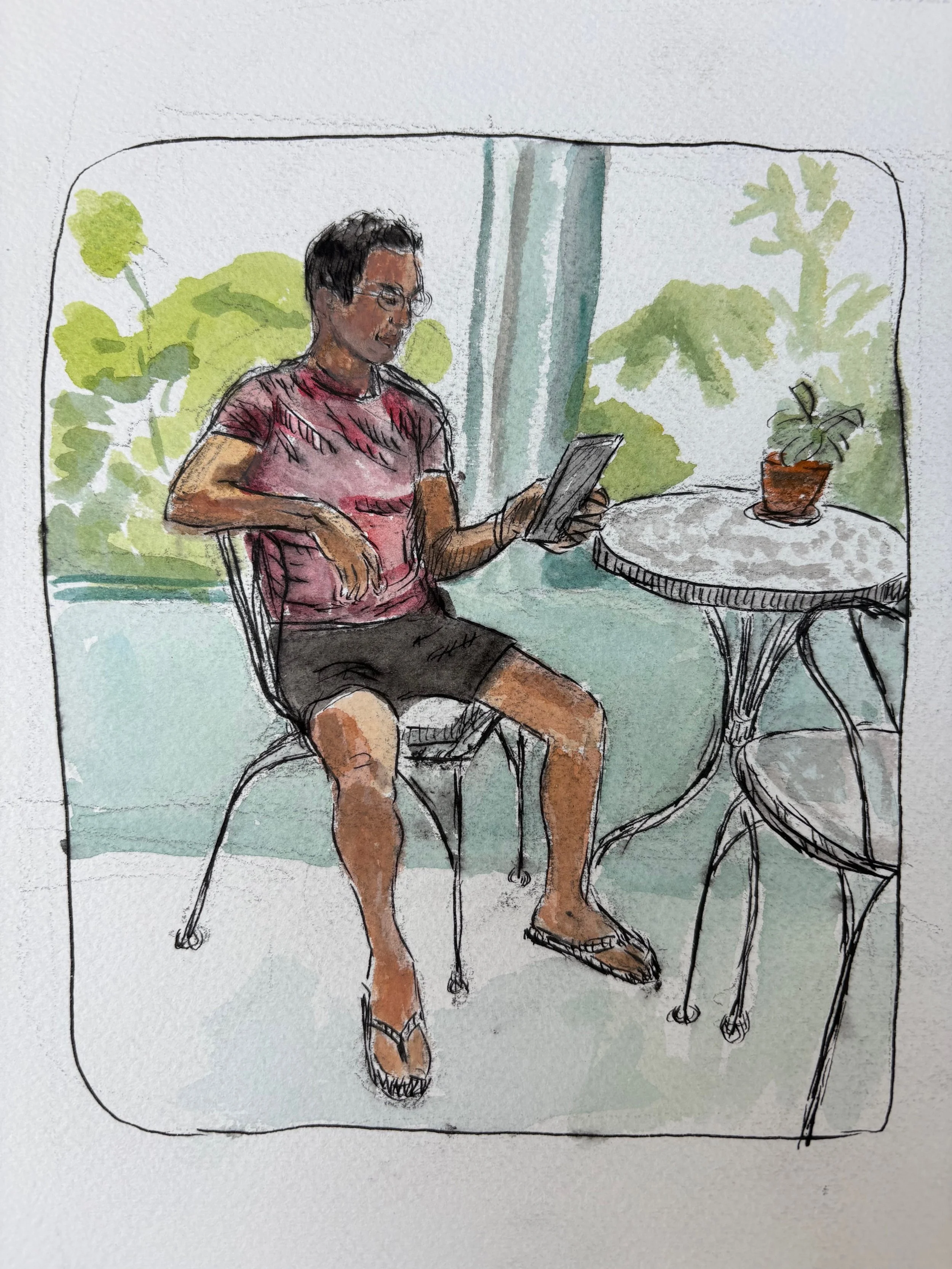I’ve been asking Austinites “Can I turn you into art?” and painting them while interviewing them about what they’re reading. Why? In this age of the algorithm, we are constantly being manipulated regarding our choices for books, news, movies and music. It’s more important now than ever to talk to other humans, in person, and learn about someone else’s experience outside our own. Please explore the gallery below and get some reading suggestions!
Kim Nguyen is reading “Being Mortal” by Atul Gawande. Why is she reading this book? Kim: “It’s a memoir and a physician’s thoughts on medicine and being older and dying. It’s really well-written. It’s (Gawande’s) perspective on being a gerontologist and seeing other gerontologists and how they handle aging. It makes you think about how you live the end of your life and what you want.” Most interesting insight so far? Kim: “He mentions several studies about autonomy — control over your day and your life. When people go into nursing homes, it’s the control that they miss...It makes me think, as I age, would I want to be at home? Or would it be a burden on my family?” Now I am really interested in reading “Being Mortal.” I’m half way through life at this point myself, and I’ve actually been thinking a lot lately about “how do I age well?” Thanks, Kim, for sharing!
Jeremy Striffler is reading “The Guide” by Peter Heller, which is a thriller set against the backdrop of a raging wildfire in a national park. Why is he reading this book, and what does he like about it? Jeremy: “This is a sequel to (Heller’s) ‘The River.’ It’s a modern western...One of the characters is now a fishing guide at an exclusive fly fishing retreat. The style is very punchy, and it’s really well-written. It’s interesting because the main character is now 25. Usually, when you read thrillers the characters are much older. These characters are young, just out of college. They’re not action heros.” I frequently search for thrillers myself and usually land on a John Grisham. I’ll have to give Heller a try soon. Thanks, Jeremy!
Camilo Nova is reading “A Mind for Sales” by Mark Hunter. What is this book about? Camilo: “This book is about understanding the customer and helping them...A preconception of sales people is that they are people who scam others. And I have been scammed. I like this approach of people having integrity.” Why is he reading it? Camilo: “I’m trying to get better at talking to people. I am an engineer. I love to solve problems. I realize I need to understand people to understand the problem.” I love it when I meet a self-aware person like Camilo who is broadening his skill set. Sounds like a good read. Thanks, Camilo!
Forrest Dwyer is a novelist who is reading “Band of Brothers” by Steven Ambrose. This is the story of Easy Company, 506th Regiment, 101st Airborne Division during World War II. It details their challenging assignments from D-Day to capturing Hitler’s Eagle’s Nest. In 2001 it made into an Emmy award-winning TV miniseries. Why is he reading this book? Forrest: “I watched the show a long time ago. I had a friend moving out of Austin. He said there were three books that were his favorites, and this was one of them.” A recommendation from a good friend is always a reason to read a new book. It’s a way to experience something an algorithm won’t give you. I’m tired of the recommendations I get from Spotify, Amazon and Netflix, which always suggest things they’ll think I like based on my previous listens and watches. What if I want to discover something new? What if I want to learn about someone else’s experiences or tastes? I love it when I stay at a hotel, and a previous guest has forgotten to log out of their Netflix account. I love browsing and experiencing a whole new world of shows that I could never find otherwise. In an algorithm-ruled world, it’s crucial that we need to connect with other humans. Thanks, Forrest.
Katie Rice is a fiction writer who is working on a novel that involves an “injection of otherworldliness,” which is not her comfort zone. So she decided to read Lewis Carroll’s classic “Alice in Wonderland.” Katie: “I’m reading it for the plot. What happens by the end is that Alice has changed in her capacity for wonder...It’s been great. Kind of wild. Pretty weird.” I got a bit curious and found some interesting commentary by Morton Cohen, a Victorian scholar and biographer of Carroll, who explained the continuing popularity of Carroll’s work. Morton’s 2017 New York Times obituary has the following: “Children’s books had existed for centuries before Charles came along,” he wrote, referring to Carroll by his given name, but rather than preach to young readers, Carroll’s books “fly in the face of that tradition, destroy it, and give the Victorian child something lighter and brighter. “Above all,” he added, “these books have no moral.” Thanks, Katie!




